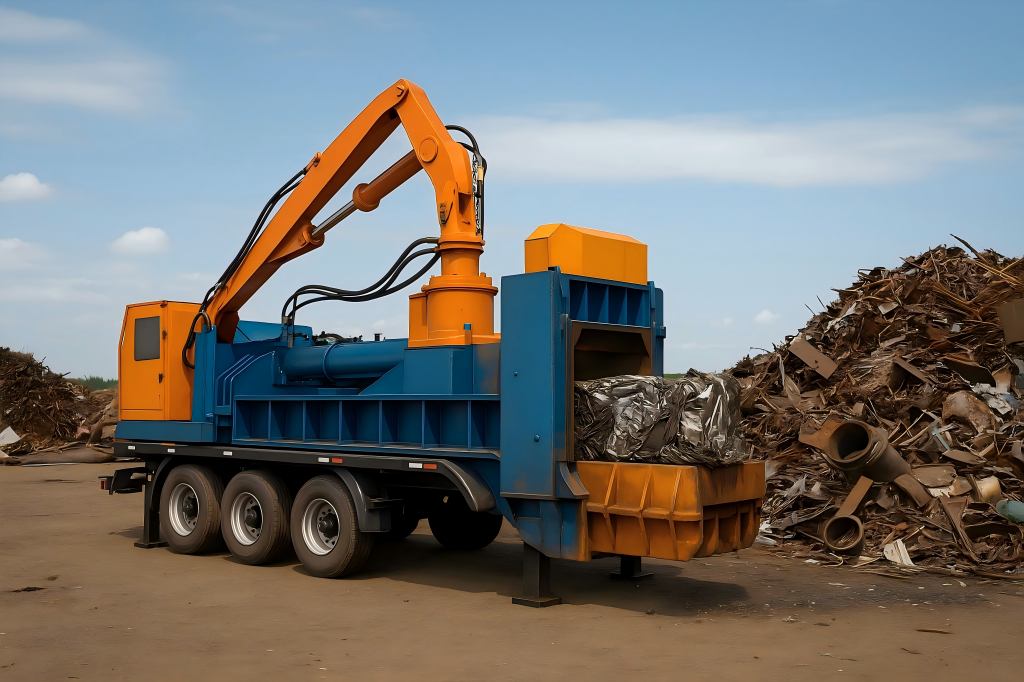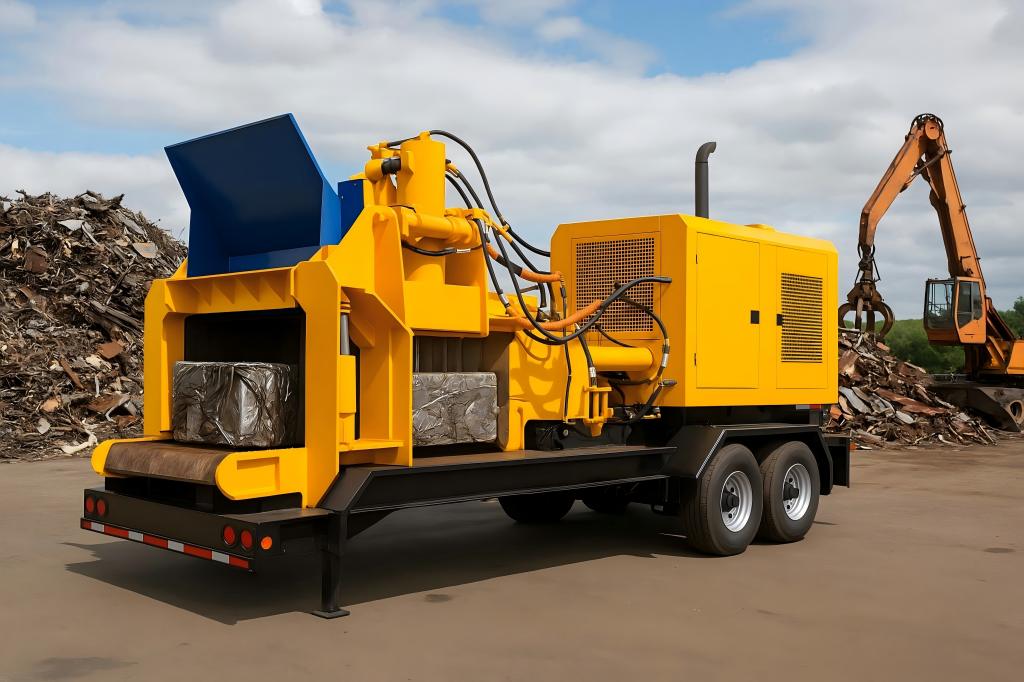Scrap metal recycling plays a key role in the circular economy by saving raw materials, cutting energy use, and reducing environmental impact. As demand for efficient recycling grows, mobile scrap metal balers have become a popular solution, offering speed, flexibility, and on-site processing. But are they worth the investment?
This article explores their technology, benefits, costs, and return on investment to help businesses decide if portability is the right choice.
Understanding Scrap Metal Baler Technology
What Is a Scrap Metal Baler?
A heavy-duty piece of equipment called a scrap metal baler is used to condense and compress scrap metals, such as steel, copper, aluminum, and mixed metals, into dense, controllable bales. These bales are easier to transport and store, and are often required by steel mills or smelters for further processing.
Stationary vs. Mobile Balers
| Feature | Stationary Baler | Mobile Baler |
| Portability | Fixed in one location | Mounted on wheels or trailers |
| Operating Site | Recycling yards, warehouses | Construction sites, demolition areas |
| Setup Time | Requires installation and foundation | Ready-to-use or minimal setup |
| Transport Needs | Scrap must be moved to the baler | Baler moves to the scrap source |
| Cost Range | $50,000 – $500,000 | $100,000 – $400,000 |
The Core Value of Portability
On-Site Efficiency
Mobile scrap balers enable operators to compress metal directly at the site of collection. This drastically reduces the time, manpower, and logistics needed to move unprocessed scrap to a central facility.
Reduced Transportation Costs
Transporting loose or bulky scrap metal is expensive due to the air space it occupies. Mobile balers compress this material on-site, allowing for more efficient transport and reducing fuel consumption and truck wear-and-tear.
Versatile Deployment
From demolition sites to rural scrap yards or mining locations, mobile balers are highly adaptable. This versatility makes them attractive to contractors, mobile recycling services, and municipalities.
Types of Mobile Scrap Metal Balers
Trailer-Mounted Balers
These units are towed to sites using heavy-duty trucks. They’re commonly used for medium to large operations that require full hydraulic power and bale density.
Self-Propelled Balers
With built-in engines and tracks or wheels, these units can drive short distances onsite. They’re particularly useful in large scrapyards or industrial zones.
Skid-Mounted Compact Units
These offer mobility between closely located sites. Though less powerful, they are more affordable and suitable for small-to-medium operations.
Crucial Elements of a Mobile Baler
| Feature | Description |
| Bale Size and Density | Higher density equals better transport value |
| Cutting Force | Indicates the power to shear and compress tough metals |
| Hydraulic System | Determines speed and consistency of operations |
| Engine Type | Diesel-powered for off-grid operations; electric options are less common |
| Automation & Controls | PLC systems or remote control for ease of use |
| Safety Features | Emergency stops, shielding, overload protection |
Operational Scenarios Where Mobile Balers Shine
Demolition and Construction Sites
Construction and demolition projects generate tons of rebar, steel beams, and other metals. Mobile balers allow real-time processing, reducing clutter and improving site safety.
Agricultural and Rural Scrap Cleanup
In rural or underserved regions, hauling scrap to distant yards is inefficient. A mobile baler can collect and process material across farms, barns, and depots efficiently.
Disaster Cleanup and Recovery
In post-disaster recovery operations (e.g., hurricanes, earthquakes), metal waste is abundant. A mobile baler can quickly mobilize to help compress and remove the debris for recycling.
Financial Considerations
Purchase Price
Mobile balers generally range from $100,000 to $400,000 depending on size, features, and manufacturer. Add-ons like automation, additional shears, or remote controls may increase the cost.
Operating Costs
| Expense Type | Approximate Range (Annual) |
| Fuel (Diesel) | $5,000 – $15,000 |
| Maintenance & Parts | $10,000 – $20,000 |
| Labor | Varies by use case |
| Transport & Setup | Minimal (onsite operation) |
ROI Factors
- Scrap Volume: Higher volume equals faster payback
- Logistics Savings: Reduces external transport costs
- Job Completion Time: Faster turnarounds mean higher project throughput
Case Studies: Real-World Applications
Urban Demolition Contractor in Chicago
A contractor purchased a mobile baler to process steel beams onsite. It reduced their scrap transport cost by 35% and cut jobsite cleanup time by 50%.
Municipal Waste Program in Eastern Europe
The city invested in two self-propelled mobile balers to manage scattered metal waste across several rural towns. Result: increased recycling by 40% and reduced landfill use.
Military Scrap Management
Decommissioned bases and training grounds often accumulate metal waste. Mobile balers allowed teams to process on location, reducing security risks and improving asset recovery timelines.
Limitations and Challenges of Mobile Balers
Initial Capital Outlay
In particular, small businesses may incur substantial upfront expenses. Financing options or leasing may help, but the investment still needs clear ROI planning.
Maintenance Complexity
Mobile balers require regular hydraulic, engine, and structural inspections. Field maintenance can be harder compared to stationary models located in service-equipped facilities.
Limitations in Power and Size
While mobile, these machines may not match the power or bale size range of large stationary units. This can affect the processing of heavy-duty metals like thick cast iron or train rail.
How to Decide If Portability is Right for You
| Criteria | Favor Mobile Baler | Favor Stationary Baler |
| Scrap Origin | Multiple or remote locations | Centralized facility |
| Volume Per Location | Low to medium | High |
| Transportation Budget | Tight or high fuel costs | Already optimized logistics |
| Frequency of Use | Daily or weekly | Constant high-volume operations |
| Budget Flexibility | Moderate to high | High capital available |
Market Trends and Innovations
Smart Telemetry & Remote Monitoring
Some high-end models now include GPS tracking, performance monitoring, and diagnostic alerts—ideal for fleet management and multi-site coordination.
Eco-Friendly Designs
Manufacturers are exploring hybrid or electric power systems to meet stricter emissions regulations and sustainability goals.
Modular Systems
Swappable parts like shears, bins, or control panels improve repairability and extend equipment lifespan—ideal for operations with limited service access.
Buying Guide and Supplier Checklist
When choosing a mobile scrap baler, consider:
- Reputable Manufacturer: Look for established brands with global service networks
- Warranty and Support: Minimum 1-year warranty and 24/7 parts support
- Customization: Ability to select bale size, control panel types, and safety features
- Trial Run or Demo: Always test the unit under real conditions if possible
Recommended Suppliers:
| Supplier Name | Country | Specialization |
| Unite Top Heavy Industries | China | Heavy-duty mobile scrap balers |
| Sierra International | USA | Mobile and stationary balers |
| JMC Recycling | UK | Compact baler solutions for small yards |
| Lefort | Belgium | Self-propelled high-power balers |





